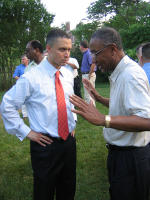 Facing Katrina hurricane expenses of perhaps $200 billion and even higher total war costs, Tennessee members of Congress on Wednesday suggested some ideas to cut spending in other areas.
Facing Katrina hurricane expenses of perhaps $200 billion and even higher total war costs, Tennessee members of Congress on Wednesday suggested some ideas to cut spending in other areas.Sending people to the moon again - at a cost of perhaps $104 billion - should be planned at a much lower cost, said U.S. Rep. John J. Duncan Jr., a Knoxville Republican.
"That's just too much," Duncan said. "Surely we can do it cheaper."
A new Medicare prescription drug plan for seniors? Delay it for a year or greatly revise it, said U.S. Rep. Zach Wamp, a Chattanooga Republican, because the 10-year cost estimate has grown from $400 billion to nearly $1 trillion.
"I find very few people who are even excited about it, let alone understand it or look forward to it," Wamp said. "The prescription drug companies love it." A year's delay in the program could save $50 billion, he said.
U.S. Rep. Harold Ford Jr., a Memphis Democrat, said "put everything on the table" to consider for cuts and look harder for waste and fraud in existing programs. "I think we figure out what we can save first with trimming spending" before considering changing tax laws, he said.
But Ford ruled out supporting cuts in school lunches for the poor or reductions for veterans programs.
U.S. Rep. Marsha Blackburn, a Brentwood Republican, said the government could save billions by better management and closer controls on spending and tax credits.
Blackburn said taxpayers are erroneously receiving about $9 billion a year in earned income tax credits, which the Internal Revenue Service could stop through tougher enforcement. Defense military exchanges could be more efficient and cut costs by about $200 million a year, she said.
"The Republican Party has an opportunity to reaffirm our position as an advocate for the average taxpayer and we shouldn't waste that chance," she said.
U.S. Rep. Lincoln Davis, a Pall Mall Democrat, said Congress can "trim programs," set up an emergency fund for disasters like Hurricane Katrina, and plan to spend only as much tax revenue as is collected.
"We need ... to fix our broken budget process ... and not have to worry about finding (funds) for natural disasters that we know we will have to deal with down the road," Davis said.
Also, U.S. Rep. John Tanner, a Union City Democrat, urged better management of existing funding to reduce annual borrowing. "Moving forward as we recover from Hurricane Katrina, we must ensure that emergency funds are used properly and reform the nation's budget process so we are better prepared in future times of need," he said.
Duncan, who opposed the initial entry of U.S. troops into Iraq, said that war and the U.S. operations in Afghanistan are costing about $300 billion over three years. "That's another area for savings. I'm strongly in favor of getting out of Iraq."
Duncan also suggested big cuts in U.S. aid to other countries and, if necessary, in aid to mass transit. He said many buses on the road carry few passengers.
Both Duncan and Wamp said they also might back across-the-board percentage cuts in all programs except those with promised annual benefits, such as veterans pensions and Social Security.
Even defense and homeland security programs should face cutbacks, Duncan said. He noted that the inspector general for defense programs found about $35 billion was spent improperly in Iraq.
It could be a good idea to start a federal bond program to aid the area damaged by Katrina, Duncan said. Some people would buy the federal bonds to aid the Gulf area, Duncan said.
"I doubt that it would raise that much money," he said, because many people already have been sending donations to charities.
Source: Knoxville News Sentinel

